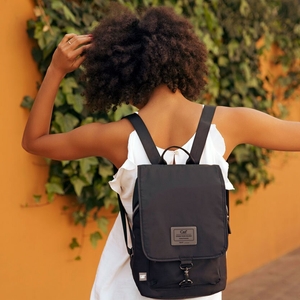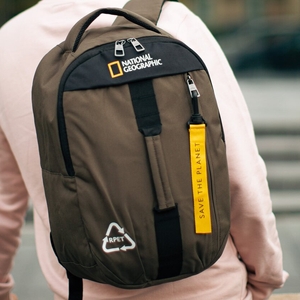Every journey begins with packing. But how do you choose the best suitcase that will faithfully serve you for many years? One of the key aspects of this choice is the material of the suitcase.
Pros and cons of different materials
Polycarbonate Suitcases
Polycarbonate is a type of thermoplastic that contains carbon. It is relatively lightweight, gives suitcases a rigid shape, and is simultaneously strong, scratch-resistant, impact-resistant, temperature fluctuation-resistant, and even resistant to chemical influence. It retains even the brightest colors wonderfully. The likelihood that a polycarbonate suitcase will crack or break during a trip only exists with very strong impacts. This type of plastic is suitable for large suitcases and transporting fragile items, as it maximally protects your belongings.
Polypropylene Suitcases
Polypropylene is currently the lightest type of plastic. Over the past few years, technology has advanced, and now polypropylene is almost as durable as polycarbonate but has special flexibility and plasticity. As a result, even with a very strong impact, the suitcase doesn't crack or chip, it doesn't deform but simply returns to its original shape. Among the drawbacks of polypropylene is the surface's vulnerability to scratches, but quality manufacturers find reliable solutions (applying special textures or lines to the surface) that protect the suitcase from such damage. Also, because of its lightness, polypropylene suitcases will be the optimal choice for carry-on luggage, where weight is really important.
ABS Plastic Suitcases
ABS plastic is another type of thermoplastic, like polycarbonate. It is lighter but less durable. Manufacturing ABS plastic is less expensive, making it a popular material among budget suitcase models. Often, quality brands use blends of ABS with other types of plastics (e.g., ABS and polycarbonate), which significantly improves this material's characteristics. This type of plastic also allows for a full-color palette and, notably, image printing. So, if you're looking for something with a bright and unusual design, you'll likely find it among suitcases made from this material.
Textile Suitcases
Textile suitcases, typically made of nylon or polyester, are known for their lightness and flexibility. They allow you to pack more items due to their elasticity but might be less waterproof compared to plastic suitcases.

How does the material affect the longevity of a suitcase?
The material of the suitcase influences its durability. Plastic suitcases, such as polycarbonate and ABS plastic, are more durable than fabric suitcases. However, fabric suitcases can last long if properly taken care of.
How to care for suitcases made of different materials?
The care for a suitcase depends on its material. Plastic suitcases can be washed with water, while fabric suitcases require special care, such as hand washing or dry cleaning.
Innovative technologies in suitcase materials
Modern technologies allow for the creation of suitcases made of combined materials, merging the benefits of different types. For instance, suitcases combining fabric and plastic offer high strength and flexibility at the same time.
Environmental considerations in material selection
When choosing a suitcase, it's important to consider its environmental impact. Fabric suitcases are generally more environmentally friendly, but plastic suitcases may last longer, reducing the need for frequent replacements.
Impact of material on travel comfort
The material of a suitcase can influence comfort during travel. Fabric suitcases are typically lighter, making them more convenient to carry, especially if you frequently move from place to place.
Conclusion
When choosing a suitcase, one should pay attention not only to its size and design but also to the manufacturing material. Each material has its pros and cons, so the choice should be based on individual needs and travel comfort. Polypropylene is an excellent universal material that suits most travelers for carrying the main set of items. Polycarbonate is also an excellent choice, especially for active travelers, but it might be a bit heavier. ABS plastic is suitable for those who travel less often and want to save money while still getting decent quality. However, it's also essential to pay attention to the quality of production and choose trusted brands that adhere to high-quality standards.
FAQ
- Why are polycarbonate suitcases so popular?
Polycarbonate is known for its strength and lightness, making it an ideal material for suitcases. - Are fabric suitcases waterproof?
Most fabric suitcases are made of water-repellent materials, but they might not be fully waterproof. - Which material is best for long trips?
For extended trips, it's recommended to use durable plastic suitcases like polycarbonate or ABS plastic. - How to care for a fabric suitcase?
Fabric suitcases are best cleaned manually using a soft cloth and liquid soap. - Can you wash a plastic suitcase?
Yes, plastic suitcases can be easily cleaned with water and a soft cloth.
If you need assistance in selecting a suitcase or have any questions, our consultants will be happy to provide a more detailed consultation in retail stores or online store at the phone number 044 390-21-28.






















